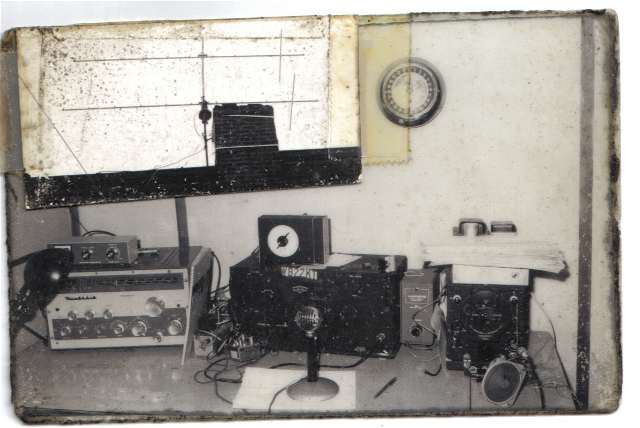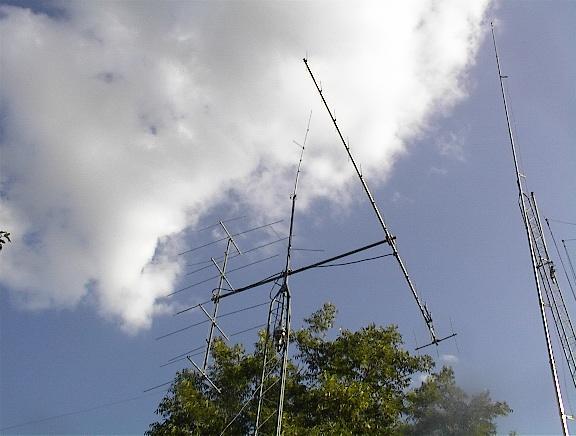| Author |
Message |
    
Danusee
New member
Username: Danusee
Post Number: 2
Registered: 10-2004
| | Posted on Thursday, October 21, 2004 - 9:42 pm: | 


|
I have a friend that just replaced his A99 (no GPK) with the Imax 2000 (no GPK). I was shocked to see that the signal difference from him didn't change enough where you could tell it when up or down. He is aprox. 16 air miles from me. His feed point is right at 40'. I wanted to say "put the A99 back up so I can see that again" but he had the A99 sold to another CBer who put it up. The A99 is now aprox. 40' to the feed point at it's new location. He added the GPK to the A99. The fellow with the A99 is almost exactly the same air miles from me as the CBer with the IMAX. I get 1/2 S unit more on the IMAX station (both claim to be transmiting 4 watts). However, I didn't get even a needle width difference with the CBer that replaced his A99 with the IMAX.
I am not partial to either antenna. I run a Archer 5/8 wave that I bought in 1977 from Radio Shack. It is aluminum with 3 ground radials aprox. 19' in length. Yes I know it must have been another false claim but one thing I do know is that my good friend 1/4 mile from me on the same elevation as myself using either of his 2 RCI radios and a IMAX 2000 (same height to tip as mine) can't hear what I can. I can hear light traffic at 45 air miles that he just can't receive and guess what I can talk to them as well. I run a Cobra 25 and D104 desk mic.
I know that the IMAX is cheap enough and built better that the A99 but I am not real impressed with it.
I think that I would go with the Maco 5/8 if something happened to mine.
I know that there is a lot of IMAX die hards out there that use the price as a security blanket but if price was a consideration why not go with the A99? It is dirt cheap and almost as good.
I wonder if the A99 with the GPK and Fireup 99 just might keep up with the IMAX?
Maybe you can help me understand why it is that the aluminum antennas at around 19' with the ground radials out perform the IMAX (at it's true 5/8 wave length). I wonder if designers know something that the majority of us don't. |
    
Mikefromms
Intermediate Member
Username: Mikefromms
Post Number: 266
Registered: 6-2003
| | Posted on Wednesday, November 03, 2004 - 11:35 am: | 


|
There are number of factors that can affect signals. A tree blocking a signal, a bldg, wires, weather conditions, etc., One experiment is not enough to prove anything. HOwever, a good metal antenna like you have should out perform a fiberglass stick. You are one of the fornunate few who have kept up a metal ground plane for nearly 30 years without major problems from wind and rain. I assume it has no problems. Most folks have rain noise and swr irregularities with metal groundplanes after awhile, but if it works, don't fix it.
The Imax is a .64 wave and 6" longer than an A-99. I hear lots of great sounding stations using A-99's, but I hear consistant complaints that the ears aren't that good. With the creation of the Imax 2000, personally, I would never own another A-99.
Again, on any given day one antenna can appear to out perform another supposed better antenna. But it is the consistant pattern of improvement in which we determine the better antenna. There is an excellent review of some of the more popular base antennas in the Subscribers review section. The title is, "How to choose an Antenna." It is really good and they have spent a lot of time and money and used some high tech equipment to do the tests. Just thought you might be interested. But it sounds like you have a superior antenna already. Happy CBing.
Regards,
Mikefromms |
    
Bruce
Senior Member
Username: Bruce
Post Number: 1726
Registered: 9-2003
| | Posted on Wednesday, November 03, 2004 - 2:47 pm: | 


|
"I hear consistant complaints that the ears aren't that good" Realy ? how did they measure this? A A-99 should be less that 1/3 "S" unit under the I-max if both are free and clear. |
    
Tech833
Moderator
Username: Tech833
Post Number: 879
Registered: 8-2002
| | Posted on Wednesday, November 03, 2004 - 4:25 pm: | 


|
Because aluminum antennas are built from tubing that is much larger diameter than the thin wire inside the fiberglass antennas, they have a slightly larger 'capture area'. Also, the matching network is normally less lossy than the capacitively coupled Imax and A99.
Your aluminum antenna IS working better than your friend's Imax. |
    
Gonzo
Member
Username: Gonzo
Post Number: 92
Registered: 9-2004

| | Posted on Thursday, November 04, 2004 - 6:50 pm: | 


|
I agree with Tech883.
And I see you mentioned capture area, this is important in recieving.
Capture Area: CB signals travelling through the air are actually EM (electromagnetic energy). In simple terms: electricity.
This EM arrives at your antenna, and converts back to useable signal voltage, and travels down the coax into your reciever.
The Larger the area that this EM lands upon and travels down upon, before getting to your reciever the greater the signal voltage that is produced(Power Gain). In effect creating more signal strenght at your "S" meter and better reception, as your reciever has a greater signal voltage to amplify before you hear it in your speaker.
-----------------------------------
The Formular for Capture area is The gain of your antenna X area of your antenna squared / frequency /divided by 4 X pie (3.14)
In others words a really annoying formular.
-----------------------------------------
This is why... as Tech883 said: The larger sized aluminum antenna WILL hear more then smaller fiberglass antenna. |
    
Bruce
Senior Member
Username: Bruce
Post Number: 1731
Registered: 9-2003
| | Posted on Thursday, November 04, 2004 - 11:17 pm: | 


|
PERSONLY
I think using " capture area " on a low frequency like 27 mhz is a bit streched. Now on 440 YES it makes a world of diffrence. At 27 your fighting outside noise and it will limit what you can hear. Again at 144 and up the background noise levels are very low and the size of antennas are very small this becomes VERY IMPORTANT. Cushcraft made a DX array many years ago which used phased dypoles as 4 stacked 3 elm beams it had a large capture area and could hear things most beams could not. Look closely at this old station photo the antennas was STACKED 11 elm cushcraft beams for its day a very good antenna to work with.
 |
    
Bruce
Senior Member
Username: Bruce
Post Number: 1732
Registered: 9-2003
| | Posted on Friday, November 05, 2004 - 4:39 am: | 


|
 |
    
Gonzo
Member
Username: Gonzo
Post Number: 93
Registered: 9-2004

| | Posted on Friday, November 05, 2004 - 12:07 pm: | 


|
Bruce, yes at higher frequencys capture area becomes very important. This is why effective VHF antennas have to be physically large almost as much as those on lower frequencys.
However by your own example, you have shown that it does make a difference on 11 meters. Although I admit a slight difference, but never the less, a difference. The Cushcraft antenna array was a 10M switchable dipole array I believe 4SV10-DX, or something similar to that, I can't remember back that far.
Yor pictures didn't come out on my computer, BTW |
    
Bruce
Senior Member
Username: Bruce
Post Number: 1734
Registered: 9-2003
| | Posted on Friday, November 05, 2004 - 1:25 pm: | 


|
The " DX" array was made from about 1966-1973 it was in effect 3 stacked FULL WAVE 3 elm beams very nice on 2 am/ssb. capture effect is at best small below 30 mhz and because of the higher noises PERSONLY i would be more concerned with pattern control.
 |
    
Bruce
Senior Member
Username: Bruce
Post Number: 1734
Registered: 9-2003
| | Posted on Friday, November 05, 2004 - 1:41 pm: | 


|

Look on the left on center tower you will see a cushcraft DX array probley the best mid size 2 meter am/ssb antenna ever made
|
    
Bruce
Senior Member
Username: Bruce
Post Number: 1734
Registered: 9-2003
| | Posted on Friday, November 05, 2004 - 1:50 pm: | 


|
So as not to confuse anyone ....
The antennas on the dx array photos were not mine but that is the only photo i could find ANYWHERE of this style of antenna. Cushcraft had problems with the insulators and it became too costly to reengineer the antenna and it was discontinued and never produced again. ONE antenna produced about 13 DBD of gain and old copy of the VHF antenna handbooks ( 1960's ) have instructions on how to build your own.
|
    
Bruce
Senior Member
Username: Bruce
Post Number: 1737
Registered: 9-2003
| | Posted on Saturday, November 06, 2004 - 8:22 am: | 


|
correction ..........
4 stacked 3 elm full wave beams |
    
Gonzo
Member
Username: Gonzo
Post Number: 94
Registered: 9-2004

| | Posted on Saturday, November 06, 2004 - 9:34 am: | 


|
Very cool Bruce |



